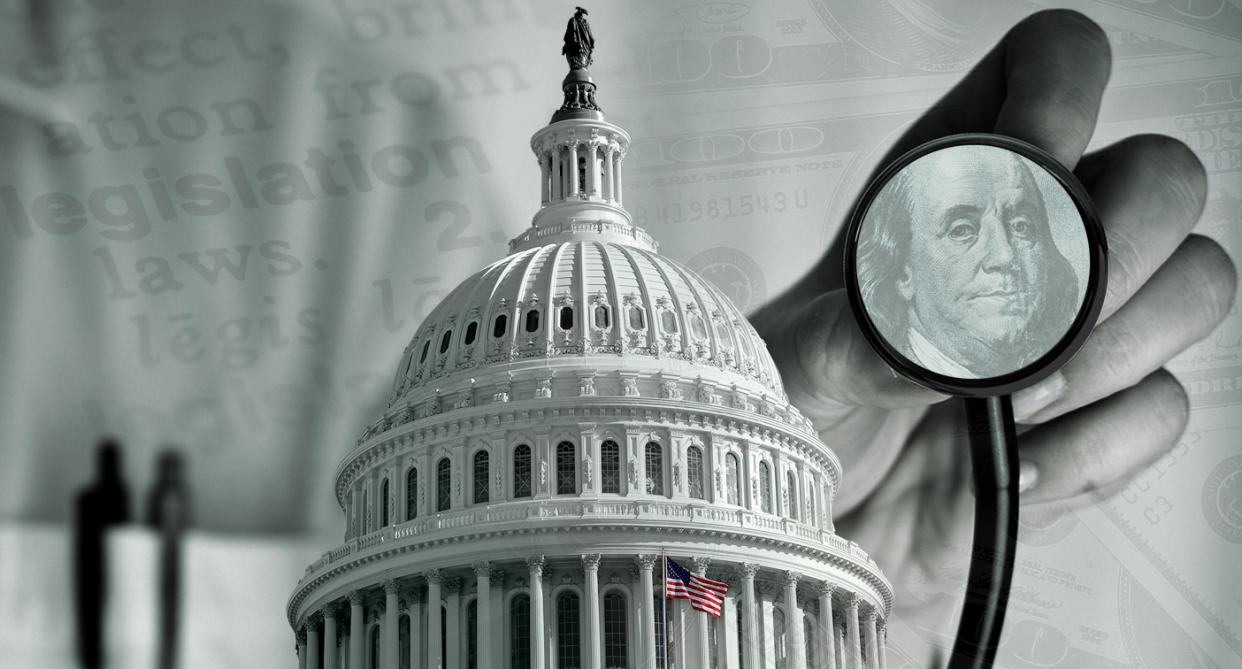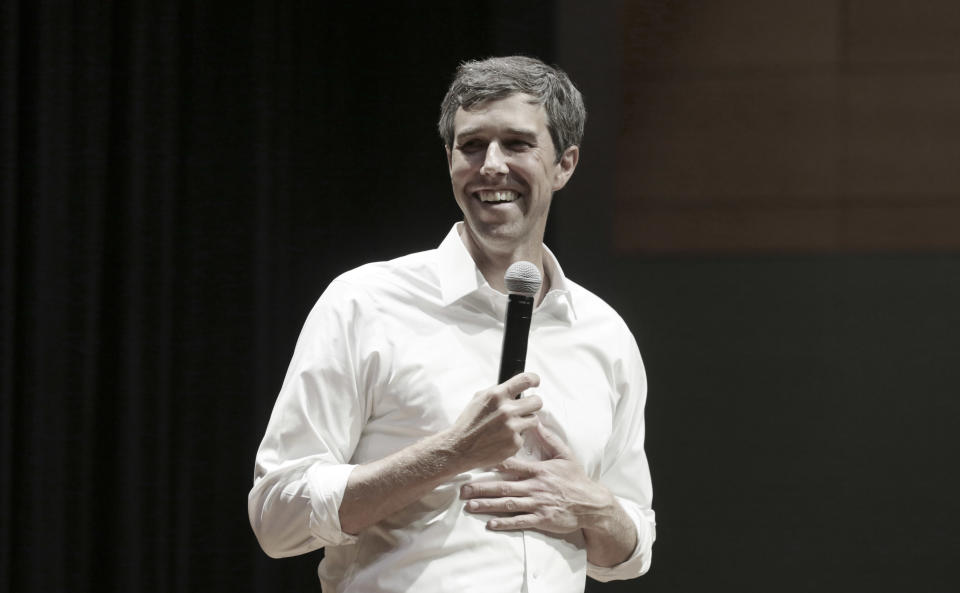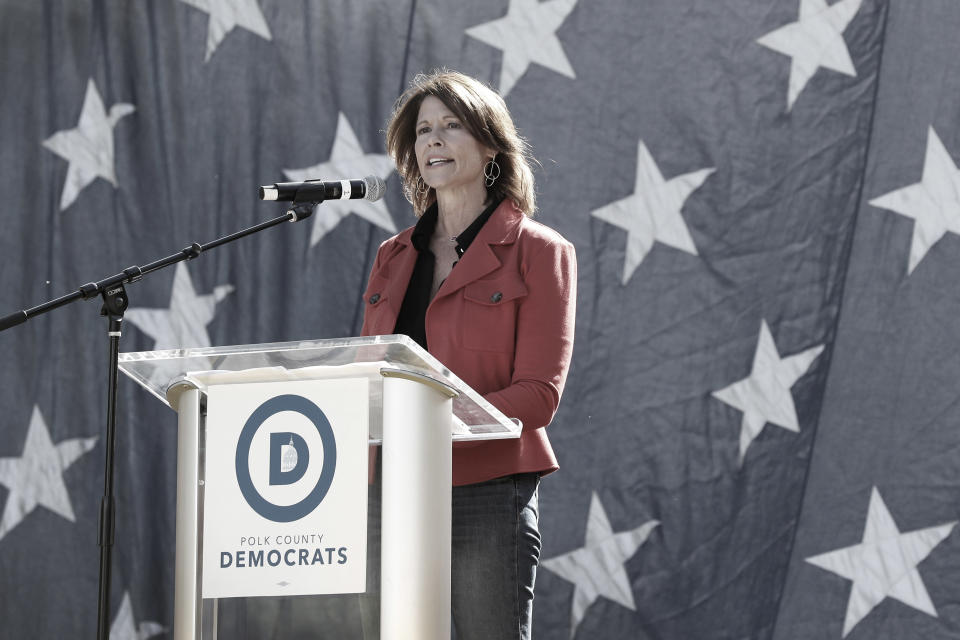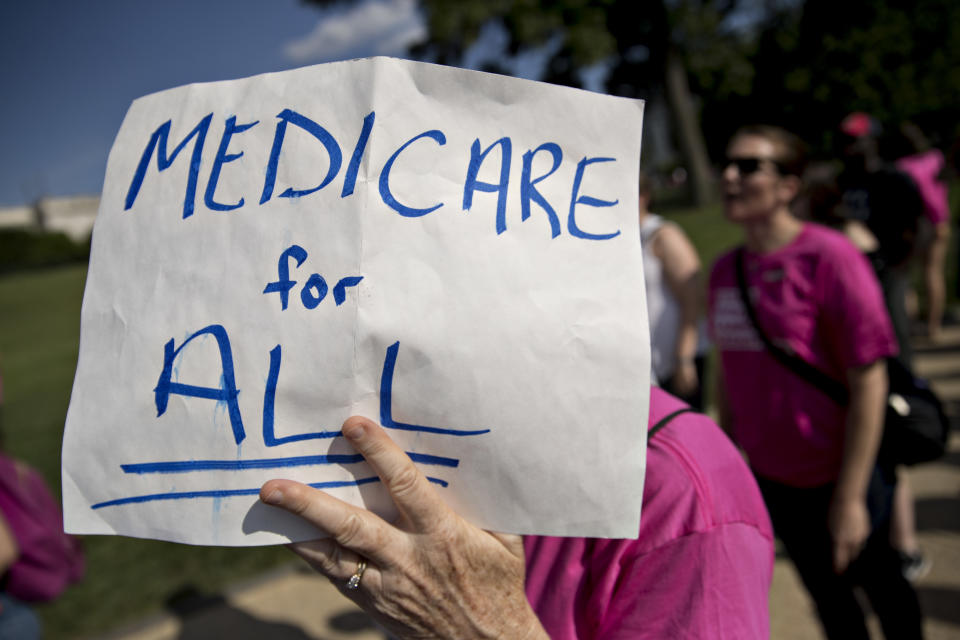Democrats edge toward running on universal health care

Democrats have a problem: Despite the historic unpopularity of the White House’s current occupant, their own favorability ratings are not much higher. But a series of health care proposals laid out during the past month might provide a more popular path forward, building off the momentum of the campaign to protect Obamacare that has raged all year.
The most recent proposal put forth in Congress is the State Public Option Act, which would allow citizens to buy into Medicaid, the decades-old program that provides health care for Americans with low incomes and disabilities. The plan would give states the option of offering Medicaid to all residents regardless of income. A majority of states expanded their Medicaid rolls after Obamacare, but this legislation would give the option of allowing anyone to buy into the program.
Coming just days before the proposed Medicaid expansion was the equally ambitious Medicare-X Act, which would offer all Americans the ability to purchase the government health care plan now available for people 65 and older. The legislation would initially target areas where health care choices are limited before expanding to cover the entire country, building on the existing Medicare network. Americans who wanted to keep their current plans would be able to, with the public Medicare option in theory lowering the costs of health care plans in the market.
According to a Kaiser study, 26.2 million Americans were uninsured in 2016, with per capita spending double the cost in the United States versus other developed nations.
Those bills come on the heels of two measures introduced this summer. In August, Sen. Debbie Stabenow, D-Mich., introduced the Medicare at 55 Act, which would allow Americans to buy into Medicare at age 55, down from the current qualifying age of 65. (A similar bill introduced in the House would lower the eligibility age to 50.) In September, Sen. Bernie Sanders, I-Vt., proposed a single-payer plan, which would set up a national health insurance system run by the federal government. (Rep. John Conyers, D-Mich., has introduced similar bills in the House since 2003.)
The Sanders proposal has received some high-profile co-sponsors from the Democratic caucus, all of whom also supported the State Public Option Act: Cory Booker of New Jersey, Kirsten Gillibrand of New York, Kamala Harris of California and Elizabeth Warren of Massachusetts, all senators whose names are often floated as potential contenders in the 2020 Democratic presidential primary. That’s in addition to Sanders himself, the runner-up from the 2016 primary who could reenter the fray in the next cycle. Sponsoring a bill is obviously not the same thing as making something a campaign focus, but it seems safe to assume that potential presidential contenders would not align themselves with something they thought would hurt their position with voters down the line.
Significantly, the congressman who introduced the State Public Option Act is Rep. Ben Ray Lujan, D-N.M., who also serves as the chairman of Democratic Congressional Campaign Committee. In that role, Lujan will help coordinate the party’s 2018 electoral strategy, seeking to ride the low approval ratings of President Trump and the GOP to retake the House for the first time since 2010.

Rep. Beto O’Rourke, D-Texas, is a co-sponsor of both the Medicare-X and State Public Option Acts. The third-term congressman from a district around El Paso is hoping to make health care access his signature issue in a planned 2018 Senate campaign against Republican Ted Cruz. Is he concerned about a conservative state like Texas resisting the idea of government overreach into health care?
“I really don’t hear much on people’s anxiety about socialized medicine,” said O’Rourke in an interview with Yahoo News last week about his town halls around the state. “What I really hear are people’s frustration with the government’s inability to figure out a system that ensures that everyone has health care, or can see a doctor, or be able to afford their medications.”
O’Rourke relayed one woman’s story that illustrates a problem with the current system. At a town hall in Fort Stockton, she told him she was upset with Obamacare, with O’Rourke himself, with Democrats and with former President Barack Obama because she worked hard and earned too much to enroll in Medicaid, but she didn’t make enough to be able to afford a private insurance plan on the Obamacare exchange. Expanding Medicare or Medicaid would, in theory, close that gap for Americans who are between income tiers.
“I’ve rarely had somebody come up and say, ‘Hey, we are overly generous; too many people have health care,’ said O’Rourke. “I think everyone gets that it’s not just to the benefit of the person who’s insured, it’s to the benefit of the state and the country. When people are more productive, they can work, they can take care of their families, they can finish school, they can contribute to their communities. They can live to their full potential, and you can’t do that if you’re not healthy enough to accomplish those things. I think there’s a growing awareness, understanding and energy around that.”
Rep. Cheri Bustos, D-Ill., is in a relatively rare situation among members of her caucus. Last year she won her district in western Illinois by 20 points — even though it went for Trump in the presidential race. As Democrats looked to recover from the losses of 2016, she was elected as co-chair of the Democratic Policy and Communications Committee, which will also help to craft messaging around the party’s 2018 platform. As the only Midwesterner among a House leadership dominated by the coasts, Bustos has taken on the role of a heartland whisperer.
Democrats are looking to pick up seats in the Midwest, Bustos explained in an interview with Yahoo News. “And the people in districts like mine and across the heartland, they’re very practical people, and I have not had one person outside of a political event come up to me and start saying, ‘You need to be for Medicare for all’ or ‘You need to be for single payer.’”
“If I go to a party function or if I have a group of politically active people, those are the people who talk more in those terms,” Bustos continued. “Everyday people who are just working and trying to figure out life, what they say is they just want to make sure they have access to affordable health care. I would say the right way to talk about this as a whole, let’s fix what’s not working very well. And that’s the affordability of health care, and that’s the co-pays, premiums and deductibles. And No. 2 is the cost of prescription drugs.”

Bustos listed a number of options for improving Obamacare, a program she vociferously defended during repeal attempts earlier this year but that she has said could be made better. She listed negotiating lower prices for prescription drugs as a plan that’s both popular and easy to communicate to voters. Bustos also endorsed the idea of expanding a number of pilot projects that were successful under Obamacare, such as bundled payments, which set a fixed price for procedures in advance. Bustos didn’t rule out the idea of increasing access to Medicare, a program with high approval ratings that receives enthusiastic support from her 84-year-old mother.
“It is something that works,” said Bustos of Medicare. “It also has the lowest administrative [costs] of pretty much any health care delivery that we have in our nation. We can learn from that. The argument about lowering the eligibility age for Medicare, I’m willing to certainly say if that’s the best way we can produce outcomes and reduce costs, then we have to take a deeper look at it, but we have to make sure that it’s something that’s affordable, that it’s something that would work. I’m open to taking a look at any health care delivery model that’s going to work, but you always have to weigh the costs and the benefits. I don’t think we want to go to anything that’s only going to have all Democratic support or all Republican support — that’s the problem with the Affordable Care Act.”
The Democratic leader in the House, Rep. Nancy Pelosi, declined to co-sponsor the single-payer proposal in September, citing the need to focus on defending the ACA. She has been heckled at Democratic events for not pushing for the expansion. Pelosi lost her position as speaker of the House when Democrats lost their majority in 2010, with many voters motivated by antipathy toward Obamacare. The Center for American Progress, a left-center think tank that was closely aligned with the Hillary Clinton campaign, put forth the Bipartisan Legislation to Lower Premiums and Stabilize Insurance Markets as a response to Republican attempts to repeal Obamacare earlier this year, a potential Democratic solution to health care that’s not as bold as Medicaid or Medicare for all.
There are cautionary examples of expansion attempts that failed at the state level. In Colorado, a plan to create a single-payer program for residents was crushed at the ballot box last November after it was rejected by both Democratic leadership and some progressive groups for a wide range of reasons. A single-payer bill in deep-blue California was shelved earlier this year in the statehouse. Critics said it was flawed legislation.
But the Republican attempts to repeal Obamacare have resulted in a change in attitude toward the law: In April, it reached majority approval for the first time amid various GOP proposals to replace it with plans that were projected to leave millions more Americans uninsured. Last month, two surveys found Obamacare approval holding steady at more than 50 percent, with Public Policy Polling finding it at plus-18 approval vs. disapproval, and even Fox News polling putting it at plus-12.
But it’s not just Obamacare that became more popular when the threat to it became real. Polling shows that people want the government more involved with health care. Sixty percent of the respondents in a June Pew Research survey said that the government has a responsibility to make sure all Americans have health insurance, up from 47 percent just three years ago.

For Democrats who want to push left on health care, the election results earlier in November provided some encouragement. In Maine, one of 19 states that did not expand Medicaid for its residents under Obamacare, a ballot initiative to accomplish that won with 59 percent of the vote. (Maine’s Republican governor, Paul LePage, has said that despite the ballot initiative’s success he will not expand the program unless the state legislature funds it.)
There was also the exit polling from Virginia in which 77 percent of those who supported Democrat Ralph Northam for governor cited health care as the issue that mattered most to them. Northam has been a supporter of expanding Medicaid, which has been blocked by the state’s Republican legislature. Lee Carter, a 30-year-old Democratic Socialist who upset a member of Virginia’s House GOP leadership, is also an outspoken supporter of Medicaid expansion.
None of these proposals could plausibly be enacted at the federal level before 2021 — and only if Democrats can wrest back control of both houses of Congress and the White House. In polling done earlier this month, CNN put the Democratic Party at negative-17 favorability, a number near the depths of the White House and Republican Party it’s competing against. But after a series of rowdy town halls across the country, full of crowds urging not just the protection of health care access but the expansion to all Americans — and poll numbers to back up those viral clips about the popularity of such programs — campaigning on Medicare and Medicaid for all could be a path forward for the party currently out of power at both the national and state levels.



